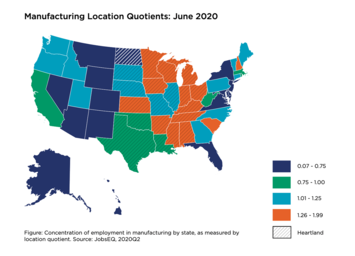
The COVID-19 pandemic has had overwhelming impacts on our economy, not to mention the impact on lives and personal wellness.
The critical lack of medical equipment to treat and protect those affected highlights the over-reliance of United States manufacturing sector on overseas production. The offshoring issue extends beyond current pandemic concerns, however, reaching far larger and more permanent concerns over industrial supply chains, worker training and even national security.
Reshoring is the relocation of production facilities to, or the creation of new ones in, the United States. Many domestic and foreign companies are recognizing the strategic advantages of locating in the United States, such as protecting intellectual property, shortening supply chains and shrinking wage differentials1 between the United States, China and other overseas locations. Some estimates suggest that firms fail to accurately estimate the costs of production in other countries by as much as 20 percent. Considering these additional costs, experts suggest that 10-30 percent of projects considering locating production outside of the U.S. would find that it would be cheaper to remain or expand within the country. As a result, jobs stemming from reshoring activity are estimated to have reached over 400,000 in 2019, and that number is expected to grow.
The U.S. Heartland stands to benefit the most from reshoring activity. Because of its historic dependence on manufacturing, there remains a culture, skilled labor pool and training programs, as well as infrastructure to support production facilities. The presence and diversity of existing manufacturing throughout the region also supports reshoring activity, since domestic suppliers are available and proximate. The growth of financial and professional services in the Heartland also make it a desirable place for manufacturers, given the shift within the industry toward out-sourcing these aspects of the business.
Bipartisan support for reshoring has never been stronger in Washington. We have seen that reshoring activity will require more than tariffs and renegotiation of trade agreements. Instead, policies encouraging the behavior will also be needed, so that carrots and sticks are an integral part of the policy framework. To truly be successful, priority should be given to sectors and companies with growth potential, such as critical supply chain gaps that impact national security. Furthermore, infrastructure improvements and enhancements are needed to ensure that the U.S. remains competitive in the broader global economy.
Read the full report at heartlandforward.org.
Joel Kotkin is the author of The Coming of Neo-Feudalism: A Warning to the Global Middle Class. He is the Presidential Fellow in Urban Futures at Chapman University and Executive Director for Urban Reform Institute. Learn more at joelkotkin.com and follow him on Twitter @joelkotkin.
Michael Lind is an American writer and academic. He has explained and defended the tradition of American democratic nationalism in a number of book, beginning with The New Class War (2020). He is currently a professor at the Lyndon B. Johnson School of Public Affairs at the University of Texas at Austin.
Dave Shideler is the Chief Research Officer at Heartland Forward, oversees research focused on identifying practical tool and policies Heartland communities can use to enhance economic performance and prosperity. Before Heartland Forward, Dave was Professor of Agricultural Economics at Oklahoma State University and Community and Economic Development Specialist with the OSU Extension Service. Those roles focused on entrepreneurship and assisted rural communities with economic development planning and implementation. Dave holds a Ph.D. in Agricultural, Environmental and Development Economics from The Ohio State University.
Image credit: Heartland Forward, from the report












